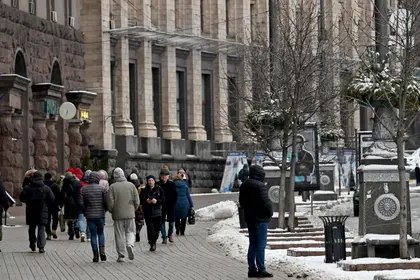Since November 2023, Russia has been waging what is code-named “Maidan-3” – an information campaign aimed at destabilizing Ukraine. The goal is to stir up internal conflict that could weaken the country's position both on the front line and in the international arena.
The “Maidan-3” plan appears to refer to the Revolution of Dignity, which originated from the Euromaidan protest movement in Kyiv's Independence Square, known as Maidan Nezalezhnosti.
JOIN US ON TELEGRAM
Follow our coverage of the war on the @Kyivpost_official.
The Maidan protests of 2013 were initiated against then president and Kremlin puppet Viktor Yanukovych. He attempted to curtail Ukraine's hopes for European integration by abandoning the domestically popular Association Agreement with the EU.
This agreement was meant to establish new political and trade relations between Kyiv and the EU.
Yanukovych used brutal force to disperse the protesters, but in response to the violent crackdown, many more Ukrainians joined the movement. After several months of struggle and the deaths of more than 100 activists, now known as the “Heavenly Hundred,” Yanukovych was ousted in February 2014.
That same month, Russia seized Ukraine’s Crimean peninsula, and backed separatist movements in the Donetsk and Luhansk regions.
The Kremlin has always portrayed the Revolution of Dignity as a coup d'état.
Ukraine’s Main Directorate of Intelligence (HUR) told Kyiv Post that the Kremlin's Maidan-3 propaganda campaign is ongoing. It is expected to peak in April-May following the Russian presidential election set for March.

Ukrainian Partisans Report Finding Russian Fuel Depot, Tanks in Crimea
The team of Vladislav Surkov, a politician considered to be the Kremlin's chief curator of Ukrainian “policy,” is considered to be behind the current campaign. It was he who is also understood to have laid the groundwork for the annexation of Crimea in 2014.
Andriy Yusov, a spokesperson for HUR, outlined the most recent Russian propaganda narratives which include:
- Disrupting mobilization and inciting public sentiment against mobilization.
- Manipulation around the issue of POWs.
- A vicious campaign against the newly appointed Commander-in-Chief Oleksandr Syrsky, mimicking radical patriotic rhetoric.
- Messages about the postponement of elections in Ukraine due to Russian aggression.
- Attempts to undermine the legitimacy of the government during this period.
In addition, Russian propaganda continues to target Ukraine in the West. Recently, Russian newspaper Izvestia published a piece on its site about an alleged assassination attempt on French President Emmanuel Macron, supervised by the head of Ukrainian intelligence, Kyrylo Budanov.
According to propagandists, the assassination attempt was prevented by the recently replaced Commander-in-Chief Valery Zaluzhny. Among the evidence provided in Russia was a low-quality video that raises even more questions.
“There is a separate campaign in the so-called Global South to spread Russian narratives against Ukraine,” Yusov said.
“They often spread theses that mostly remain unchanged since the Cold War and the Soviet Union. That is, all the propaganda clichés. At the end of the day, Ukraine has really had little presence in many countries of the Global South over the past 30 years. And Russia continues to exploit the opportunities left over from the Soviet Union. It's boosting and expanding them today.”
The most common narratives are that:
- Ukrainian lands are historically Russian.
- Ukraine is not an independent state but is governed by the US.
- The war was allegedly started by the US.
Yusov argues that conducting such information campaigns both in Ukraine and around the world costs Russia much less than financing its on-going war.
Earlier, HUR representative Andriy Chernyak stated that Maidan-3 is the most expensive Russian information operation against Ukraine since the 2014 Revolution of Dignity, which the Russians have spent tens of millions of dollars to discredit.
The total budget of the operation is understood to have reached $1.5 billion, with the Kremlin spending money to purchase websites, resources, and social media accounts that make it easy to spread fake news using anonymous tools. Yusov told Kyiv Post that Ukrainian intelligence services are aware of these actions and are actively countering them.
“We are working on verification, warnings, and maintaining proper communication with administrators in certain networks,” he said.
The HUR spokesperson also noted that it is becoming more difficult for Russians to plant the requisite messages through popular media, but they still manage to do so via certain voices who spread their narratives.
You can also highlight the text and press Ctrl + Enter






